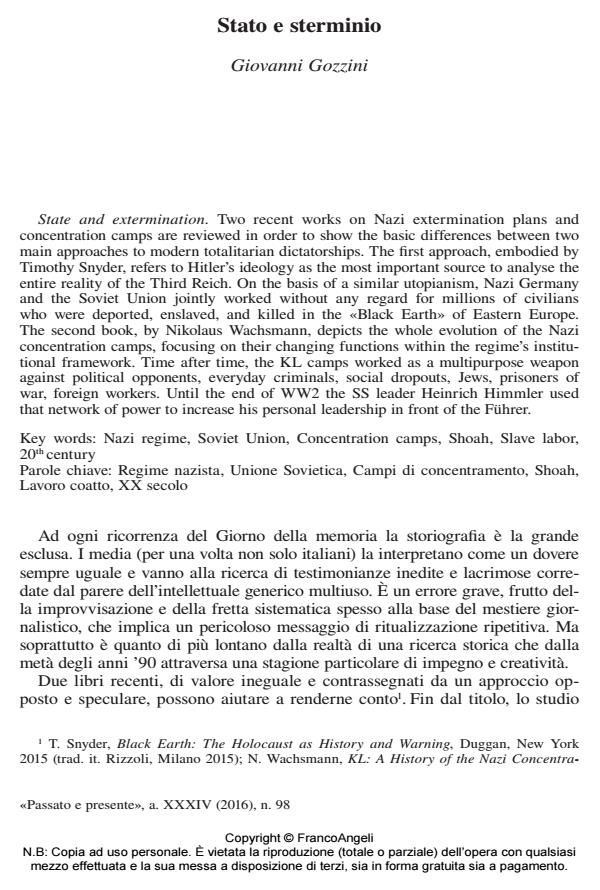Recensioni
Journal title PASSATO E PRESENTE
Author/s Giovanni Gozzini, Alessandra Pescarolo
Publishing Year 2016 Issue 2016/98
Language Italian Pages 23 P. 151-173 File size 158 KB
DOI 10.3280/PASS2016-098008
DOI is like a bar code for intellectual property: to have more infomation
click here
Below, you can see the article first page
If you want to buy this article in PDF format, you can do it, following the instructions to buy download credits

FrancoAngeli is member of Publishers International Linking Association, Inc (PILA), a not-for-profit association which run the CrossRef service enabling links to and from online scholarly content.
State and extermination: Two recent works on Nazi extermination plans and concentration camps are reviewed in order to show the basic differences between two main approaches to modern totalitarian dictatorships. The first approach, embodied by Timothy Snyder, refers to Hitler’s ideology as the most important source to analyse the entire reality of the Third Reich. On the basis of a similar utopianism, Nazi Germany and the Soviet Union jointly worked without any regard for millions of civilians who were deported, enslaved, and killed in the «Black Earth» of Eastern Europe. The second book, by Nikolaus Wachsmann, depicts the whole evolution of the Nazi concentration camps, focusing on their changing functions within the regime’s institutional framework. Time after time, the KL camps worked as a multipurpose weapon against political opponents, everyday criminals, social dropouts, Jews, prisoners of war, foreign workers. Until the end of WW2 the SS leader Heinrich Himmler used that network of power to increase his personal leadership in front of the Führer.
Political myths and gender ideologies: The mondine in the 20th century: The image of the so-called mondine, women working hard in the paddy fields, compelled to migrate far from their families, was incompatible with the 20th-century middleclass vision of a fragile female identity. As Barbara Imbergamo’s book shows, political myths, gender ideologies, and welfare policies were built by social and political institutions in different seasons to face the peculiarities of these figures and make them coherent with the underlying cultural frameworks.
Keywords: Nazi regime, Soviet Union, Concentration camps, Shoah, Slave labor, 20th century, Work, Gender, Ideology, Rights, Welfare, Paddy Fields
Giovanni Gozzini, Alessandra Pescarolo, Recensioni in "PASSATO E PRESENTE" 98/2016, pp 151-173, DOI: 10.3280/PASS2016-098008